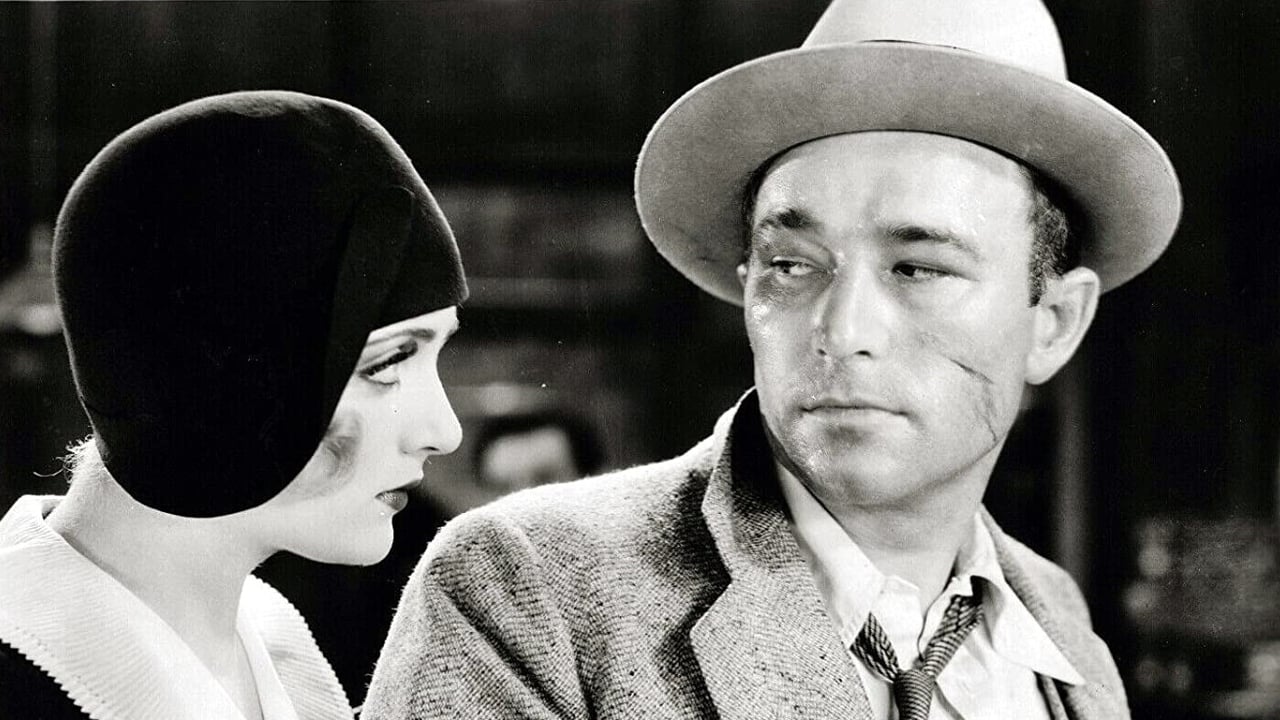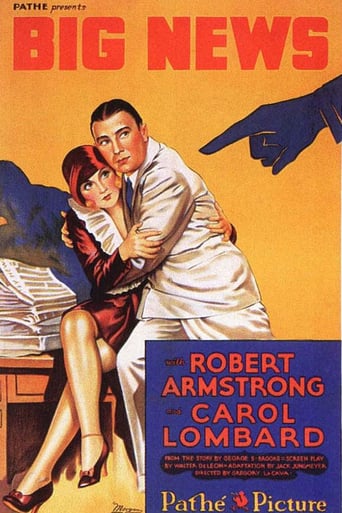

I'd give this one a 5/10 if it wasn't for some of the unique things going on. Some of it is just plain cheeky. For example, I think the name "Big News" was given to the film to confuse people with the play "Good News" that was made into a film the following year. The opening score even has some of the music from "Good News" in it, though cleverly disguised.This one is an early talkie, plus it apparently was made on the cheap at Pathe, so the entire film basically takes place in two rooms - The news room of driven but often drunken reporter Steve Banks (Robert Armstrong), and a speakeasy that is a front (it must be, there are never any customers!) for a drug dealing operation run by Joe Reno (Sam Hardy).Banks likes to go drinking with O'Neill (Wade Botellier), a drunken discredited and thus ex reporter, and Steve's absentee home life has his reporter wife (Carole Lombard as Margaret) coming to the newsroom to tell Steve she is calling their marriage quits. Meanwhile, Joe Reno is worried that Banks is going to expose his dope peddling operation, and calls the newspaper to say he's been drunk and disorderly and bothering the nonexistent customers at his completely illegal business. The paper fires him.Banks reacts by going to Reno's speakeasy with his drunken friend (WHY DOES HE NEED THIS GUY?) and HE ACTUALLY LETS HIM IN!!!. Reno then unintentionally tips his hand to Banks who gets the evidence he needs and writes up an expose on Reno's operation. This dawns on Reno AFTER Banks leaves.Banks has been fired. Reno knows this. For some reason he goes to where Banks used to work - Banks might have given the story to a completely different paper and never returned - and frames him for a crime of which he is easily absolved. Plus Reno is seen by everybody including Banks AND the cops AND everybody knows Reno had a motive to do what he did. What an idiot! I'll let you watch the terrible print that is available and see what happens.Why am I disrespecting Carole Lombard? Because she is a mere shadow of the actress she'll be just five years later. But part of it really isn't her fault. The lines she is given are ridiculous and actually sound like the stuff of title cards from the 1910s. She is either tall statuesque and silent or overacting hysterically. But she improves tremendously in just this year. Her next film, Racketeer, is much better. But you would never guess by this one performance that she is the member of the cast people are most likely to remember almost 90 years later.There is one weird angle that you would never see after the production code. I guess to fill up time there is a part for an overweight lonely hearts reporter - Helen Ainsworth as Vera - who dresses in men's' clothing and does a kind of risqué vaudeville comedy routine between scenes to lighten the mood. The paper editor warns her "Don't be gay on my time!". Only in the precode era, and probably only in this first full year of talking film. Recommended for the goofiness of it all.
... View MoreA crime comedy drama with R. Armstrong and Carol Lombard (before a 3rd vowel was added), she has more of a supporting part, which she plays in her dignified way, a bit otherworldly, spectral, very classy, her generic character in her early sound movies, a distinguished young woman; she also seemed determined on her ascending way to stardom. The supporting cast is very good.The life at a newspaper headquarter is shown as cool, but isn't glamorized. The age was more stoic, and the life's hardships are confessed, admitted, allowed, expressed; the sets show a dirty editorial office, with the throng, garbage and untidiness, and the threat of unemployment. The leading actor plays a reporter fond of his profession and of drinking.Armstrong, a very believable leading player, could be a dynamo, even as a drained journalist. I know that his reputation paled, faded afterward, which is unfair. He was credible in each leading role he has made.The movie, co-written by DeLeon, is exciting and refreshing. The _subjacent play seems good.
... View MoreEven though Carole Lombard was steadily catching the public's eye and picking up good notices she realised there was no long term future for her at Pathe. They were too busy grooming Ann Harding and Constance Bennett into stars and from the look of 1929 it seemed as though she and Robert Armstrong were going to be developed into a team!! Fortunately by the next year she was at Paramount and destined for better things.I don't think there would have been much incitement to seriously portray the effects of alcoholism at the height of prohibition - and with Robert Armstrong as the star there were going to be just as many laughs and wisecracks as serious moments. But no one told Carole and, surprisingly, she gives the film it's thoughtfulness.This is a "Battle of the Sexes" between husband and wife, "rival reporters" Margaret and Steve Banks - Margaret is the dedicated reporter of the Morning Herald who has just scooped her husband out of a "love nest, chorus girl, dope ring" story, he has just been fired by the Express because of too much time spent in speakeasys!!! The "dope" angle is more interesting - yes, in pre-coders there is often references to dope, hop heads, snowbirds etc but not to base the main story of a movie about it - unless it was one of those under the counter exploitation movies!! After being sacked once and for all, Steve storms out of Addison's office and makes good his promise to find a story that "will turn this town on it's ear" - the confession of a chorus girl Rose Perreti, exposing a big dope ring but soon after when Addison is found dead in his office all fingers point to Steve who has been set up by racketeer Joe Reno (Sam Hardy) who wants Steve out of the picture forever!!Special mention goes to "blink and you miss him" Lew Ayres as a copy boy. And Cupid Ainsworth who has the best role in the film as Vera, the paper's resident "sob sister". She has wise cracks for every occasion and bats off derogatory comments about her weight like Babe Ruth. There is even a conversation about being gay - Vera, with her very masculine looks and style of dress, is told to go and "be gay like I know you can be"!!!
... View MoreThis adult (for it's day) themed drama of a hard drinking reporter (who is also hard brawling) Robert Armstrong and his wife Carol(e) Lombard who is also a reporter and wants to divorce him is faced paced and contains not only speakeasies and drinking but a plot about the murder of a drug addict and her dealer. The drug plot line doesn't really do much but make the whole thing a bit more sleazy. The killer is caught because he is recorded on a cylinder when he doesn't know it. The reporter's boss is the murder victim. The reporter is framed by the murderer who is there at the newspaper where he commits the crime while another one of the reporter's bosses is on the phone! All ends well when Carol(e) discovers that Armstrong has switched to tea from booze in his flask which leads to a loving happy ending (he gets a raise too!).
... View More